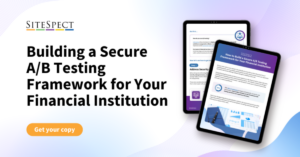Mistakes to Avoid When A/B Testing
By Kevin Plankey
October 14, 2022
Share
In this article, we’re going to talk about A/B tests and why they fail. But first, it’s important to note that gaining insight from even failed A/B tests is a good thing. It’s easy to make mistakes when A/B testing. What you want to avoid is making the same mistake repeatedly that your experiment is doomed from the start.
Lack of understanding around your goals and KPIs
It may sound simple, but all stakeholders need to be on the same page. Stakeholders should ask as many questions as possible and have as many conversations as needed to ensure everyone understands what is trying to be achieved through a particular A/B test.
If all stakeholders don’t understand the detailed goals and KPIs, they may want to see something from a particular A/B test, but by the time the A/B test is completed, you could have completely different results, and results they cannot act on.
At the end of the day, you want to make sure stakeholders are making good business decisions and that all starts with understanding the goals and KPIs so that you can take data-driven action from the results. Otherwise, it is a failure.
Poor planning
You need to understand, from beginning to end, the amount of time you’ll be running the experiment and the cost that goes into developing the experiment. And stick to the schedule. Don’t change mid-stream. Run the experiment to its conclusion, so you have the necessary data to move forward.
Poor data
First and foremost, you need to ensure that the experiment is not just from a gut feeling or an executive mandate. It should be based upon a combination of items, the first of which should be a detailed data analysis. Then look at previous A/B tests and what you learned from them. In addition, look at your competitors to see if you can learn anything from them. Finally, think about and incorporate industry best practices.
This will help you in building your hypothesis and goals. If everything is based upon a stakeholder telling you to build their hypothesis, it’s highly unlikely you’ll achieve what you are looking to.
Lack of resources
Sometimes when you don’t have dedicated testing resources at your disposal, it will call time and attention away from what could have been a good test. This is because you’re relying on people who are not actually testing experts.
Volume and iteration
You should have a sizable amount of traffic to test effectively especially if you have multiple tests running at the same time. And even if that’s the case, you’ll want to do the testing in stages and constantly iterate. So, learn how it works, and once you have a winner, start testing against that and so on.
Wish to speak with an optimization expert? Schedule a discovery call! CLICK HERE
Share
Suggested Posts
Subscribe to our blog:





